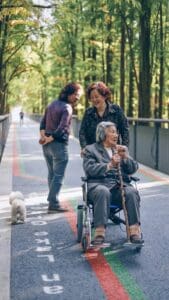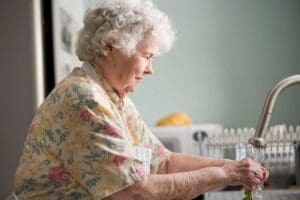***Please note: In order to work as a CDPAP aide or Home health aide click here.
Caregivers play an important role in the lives of both their patients and the patients’ loved ones. People who really shine as caregivers have specific qualities and skills that make them the perfect fit for this job.
If you want to be a professional caregiver, such as a CDPAP aide, continue reading to learn more about the caregiver skills and responsibilities that are absolutely essential for anyone who wants to be successful at it.
What skills do you need to be a caregiver?
There are certain skills that are particularly important for caretakers to have in order to get good results from patients. Some of these skills come naturally to certain caregivers while others can be learned
Most professional caregivers are strong at certain skills and a little weaker in regard to others. Caregivers who have a passion for their work will come up with a balance of the necessary skills that makes it possible for them to shine at their work.
But, an individual who isn’t a people-person and who lacks empathy and compassion, isn’t likely to be successful as a caregiver! It’s vital that professional caregivers enjoy their work and the challenges they face as a result of it in order to really be successful and well-loved by their patients, the rest of the caregiving team, and family members.
Empathy
Empathy is all about tuning in and really understanding your patients. The ability to empathize is really at the core of caregiving because if you can’t understand, through empathy, what your patients are going through, it will be hard for you to provide them with proper care.
Though, as an individual, the elderly caregiver may not have ever experienced what their patients are going through, empathy allows the caregiver to use their imagination to know their patients’ problems and challenges in order to provide better care.
Empathy is all about imagining yourself walking a mile in the patient’s shoes. If you can empathize with your patients and imagine how they feel in various situations they face, chances are you’ll provide high-quality care to them.

Patience
Everyone struggles to some extent with patience, but the very best caregivers tend to have a stronger handle on this skill than other people.
Patience means that you have the ability to slow down and that you’re willing to work hard at communication even when the person you’re communicating with is frustrated. Staying calm and staying present for the person you’re caring for is a big part of patience.
Being willing to let go of your ego to allow patients to accomplish their day-to-day goals or to communicate about an important topic is also vital. People who have a high-threshold of patience tend to make excellent caregivers because often, patients struggle with issues that cause them to feel angry, confused, and frustrated. These emotions often spur impatience!
When these emotions come out, a caregiver with patience is able to work with the patient to get through them rather than going to battle against them.
Communication
Excellent communication skills are a must for caregivers. In fact, communication is necessary not only between the caregiver and his or her patients, but also between the caregiver and the patient’s loved ones.
Indeed, caregivers often must chart the patient’s progress in terms of different health-goals for other members of the caregiving team. So excellent written as well as oral communication skills are extremely important!
Caregivers are on the front lines with patients so that means that they see and hear and experience different aspects of the patient’s lives and health status that other members of the caregiving team may miss.
By communicating clearly with the appropriate members of the team as well as the patient’s loved ones, caregivers can enhance patient care and actively promote general well-being in terms of the family system as well as the patient’s physical health.
Problem Solving
Caregiving as a profession is never boring because there are always new challenges to overcome. The ability to solve problems for yourself and for patients is a big part of the caregiver’s work.
Over the course of a typical day, caregivers will often have to change their plans, create nutritious meals, or help there patients with transportation to medical appointments.
The ability to bounce back is vital to the caregiving relationship. Though patients may get frustrated, caregivers should be able to solve problems and stay upbeat about things. The ability to do problem-solving by rescheduling and re-routing the day is a valuable skill for all caregivers.

Compassion
The ability to show compassion hinges somewhat on the caregiver’s ability to empathize with patients. Empathy and compassion definitely go together! But compassion is active. It’s a way of behaving toward patients and it tends to happen when caregivers feel empathy.
When a patient is hurting and the caregiver experiences empathy and recognizes their pain, they can then show compassion even if the patient or the patient’s loved ones are extremely angry or upset.
Compassion is all about doing unto others what you would have them do to you in the same situation. Learning how to take a patient’s blood pressure may not be the same kind of skill as showing compassion, but in many ways the ability to show compassion may be even more important than certain learned skills like taking vital signs.
Positivity
A positive attitude lends itself toward positive outcomes. The most successful caregivers tend to be very positive people for a reason.
When caregivers are positive, it makes the lives of everyone around them more pleasant and easier. A positive attitude can lift the spirits of the caregiver’s patients and spread to everyone on the caregiving team as well as family members.
If you feel positive about the work ahead of you, the quality of care that you provide will be significantly enhanced. Your patients will feel your positivity and most will respond to it in a positive way.
Though it’s important to be positive with patients, caregivers who have a positive attitude toward their work in a general way are likely to find their time at work flies by. Positivity attracts positivity so the entire staff benefits from one caregiver’s positive attitude.
Good Observation
A keen eye can save patients, loved ones, and other caregiving team members a lot of trouble! The ability to observe the finer details as well as changes in the patient’s daily patterns can be extremely beneficial to the patient.
Sometimes patients will try to hide pieces of information from caregivers if they fear their health is deteriorating, but caregivers who have an eye for detail will tend to notice the changes in their patient’s behaviors, health status, and other clues that will tip them off in regard to change.
The caregiver can then probe for information or communicate about the changes with the medical team. Noting what you observe both in writing and by talking directly to other members of the caregiving staff is also important. Caregivers who observe what may not be obvious to other people and then communicate effectively about what they’ve seen can not only save lives but also make their patient’s lives more comfortable by demonstrating that they really care.
Physical Strength and Stamina
Not everyone wants to sit behind a desk. Caregiving is an active job and caregivers are called upon to perform numerous tasks throughout the day from assisting patients with eating and bathing and Activities of Daily Living (ADL’s) to carrying groceries and lifting patients.
It’s not uncommon for professional caregivers to spend many hours on their feet, so anyone who does this job should have good physical strength and stamina. Caregivers tend to enjoy being active and moving around a lot because it passes the time quickly and keeps their work interesting.
Interpersonal Skills
Caregivers are “people-people”. They like to socialize and they tend to be very likable which is important because they interact with a lot of people: the patients, the patients’ loved ones, and various members of the medical team every day.
Good social skills are essential in this line of work because caregivers need to develop rapport or a sense of trust from their patients and everyone involved in the patient’s life. A caregiver’s interpersonal skills will help ward off the patient’s sense of isolation and feelings of loneliness. These interpersonal skills help the patient stay connected to whatever they need.
Initiative
Caregivers tend to take initiative. They don’t need to be micromanaged! That’s because most caregivers are stationed either alone with the patient in their home or in settings where they have a lot of opportunities to take their own initiative to do whatever needs to be done.
Typically, caregivers will be given certain instructions from nurses or doctors to follow in regard to the patient’s wound care or medications, but the non-medical aspects of care are left to the caregiver’s own initiative. Of course, a caregiver who doesn’t like to take their own initiative won’t last very long in this profession, but those who do will be well-loved by everyone involved!
People who are always looking for ways to help out by doing whatever it is that needs to be done for friends or family will make excellent caregivers.

What are the duties of a caregiver?
In addition to innate or learned skills that caregivers must possess in order to be successful in this profession, there are certain responsibilities that caregivers have in regard to their patients.
These responsibilities help the patient get through their Activities of Daily Living (ADL’s) with dignity and comfort. Caregivers use empathy, initiative, and the various skills that make them good at what they do to manage the responsibilities listed below on a day-to-day basis.
Bathing Patients
Bathing patients helps keep the patients healthy because good hygiene and good health go together. Caregivers may have to give bed-bound patients sponge baths. Other patients may be able to bathe in a shower or bathtub with assistance from the caregiver. Bathing patients in a manner that allows them to feel comfortable and dignified is an important responsibility for caregivers. In some facilities, patients are given sponge baths throughout the week and one tub bath weekly.
There are a number of potential challenges that caregivers face when bathing patients. Patients with contractures or wounds may be especially difficult to bathe and caregivers will sometimes need to follow specific instructions in order to care for the patient properly.
Even if patients have contractures, it’s essential to bathe the contracted body parts to help prevent the development of decubitus ulcers (bed sores). Patients who are wearing casts will need additional assistance with bathing and caregivers will be asked to follow the nurse’s or doctor’s instructions to prevent the development of skin issues as a result of improper hygiene. But no matter what the patient’s health problems, bed bound patients benefit on many levels from being bathed on a regular basis by a skilled caregiver.
Patients who are ambulatory present different challenges to caregivers. These patients are in danger of falling before, during, or after their bath.
Though ambulatory patients may be able to bathe themselves, caregivers must still monitor their bath-time to prevent falls and other types of accidents. In facilities where specialized bathtubs and bath-chairs are used to raise and lower patients into the water, caregivers should be mindful to strap the patients into the chair to avoid a major fall. Because water on the floor always presents a slipping hazard, this is a major concern that all caregivers need to be mindful of during bath-time.
Helping Patients Get Dressed
Many patients will need help from the caregiver to get dressed. Each patient is different and there are different ways to make it easier for patients to get dressed depending on the patient’s specific issues.
For example, a woman with a painful shoulder issue may have difficulties getting her arm into her long-sleeved, button-up shirts. It might be easier for this woman to adaptive clothing. In this case, the caregiver might recommend to the nurse or to family members that the patient wear these types of clothing to make it easier for her to dress.
Dressing patients who are bed bound requires special skills that can be learned by caregivers. If the patient can’t sit up, it might be necessary to instead dress the patient part-way and then roll the patient over the clothing using a special technique to dress them the rest of the way.
With the help of a partner, caregivers can sometimes dress patients with sufficient muscle tonus who are bedbound by sitting them at the edge of the bed. As a general rule, patients should be allowed to dress themselves to whatever extent they are capable in order to preserve whatever level of independence they currently have.
Allowing patients to dress themselves may require patience on the part of the caregiver because the patient will inevitably take longer to perform the task than what it would take for the caregiver to do it for the patient.
Sometimes, there are competing goals that happen while dressing the patient: there is a schedule to adhere to or even other patients to attend to so the caregiver bulldozes the patient and insists on dressing the patient rather than letting the patient dress himself or herself. In this case, it might be necessary to dress the patient.
But whenever possible, it’s important for the caregiver to set aside time to give the patient the opportunity to dress themselves. The ability to dress oneself is a sign of independence that contributes to the patient’s self-esteem.
Caregivers need to be gentle with patients during dressing to make sure that the patient feels a sense of dignity and the caregiver’s concern throughout the process. If the patient is amenable to talking, dressing can be a time when caregivers chat with their patients. Light conversation between caregiver and patient during this time can make this one of the most enjoyable times of the day for patients.
Cooking Meals
It’s very common for caregivers to cook meals for their patients, especially in home health situations. When caregivers must cook meals for their patients, it’s important that they prepare meals that the patient will like.
And it’s important that the caregiver cleans up after preparation. The kitchen can become overrun with pests if it isn’t properly cleaned and this can lead to poor health outcomes for the patient.
As a caregiver, you don’t have to be a spectacular cook, but you do have to have a sense of what’s healthy and what’s not and you have to be able to prepare simple meals like mac ‘n cheese, spaghetti, or sandwiches.
If you happen to be a fabulous cook, that’s great, but caregivers need to be sure to adhere to the specs when they cook meals for patients because often, the budget for home health meals are pretty strict. Cooking is not just about cooking but also cleaning and sticking to a tight budget.

Helping with Medication
Many patients take an array of medications throughout the day and often, caregivers are responsible for making sure the patient takes their medication according to the schedule prescribed by the doctor.
The patient’s medications play an important role in the patient’s health and caregivers who are responsible for helping with medications should follow the prescribed schedule closely and note any ill effects that are caused by the medication.
Sometimes it’s hard for patients to understand or realize that a particular medication is affecting them negatively, but astute caregivers will notice! Occasionally, one medication will interact with other medications in a negative way. Noting strange behaviors or adverse effects that a patient experiences can be life-saving.
Medication management is no small job! It’s a huge responsibility and caregivers need to take it very seriously. Missing a dose of a required prescription can have serious health consequences. Taking too much of a dose can similarly cause irreparable health damage. So it’s essential that caregivers pay close attention to the dose, the frequency of dosing, and any adverse effects caused by the prescription when they’re giving patients their medications
Cleaning
A clean space can be emotionally and mentally uplifting, but cleanliness is also physically conducive to the patient’s health. Often, caregivers are called upon to do light cleaning in a patient’s home to keep the space spic and span.
Caregivers don’t often do heavy-duty cleaning because a housekeeper is often in charge of weekly cleanings, but in the interim between the dates when the housekeeping crew is there, the patient’s space should be relatively free of clutter and reasonably clean.
On a mental-emotional level, the cleanliness of the patient’s space symbolically represents the cleanliness of their minds. This is especially true for patients who rarely get out of the house!
Having a comfortable and clean home can help patients feel good and keep a positive attitude that will affect their entire experience of being cared for by a professional caregiver.
Share This Article